 By Isabelle Pelly, independent humanitarian consultant, specialised in cash assistance
By Isabelle Pelly, independent humanitarian consultant, specialised in cash assistance
Isabelle Pelly is an expert on cash and market-based programming, currently working as an independent consultant based in Haiti.
What happens when you put a bunch of innovative and collaborative meteorologists, humanitarians and government representatives together for 2 days in the Caribbean sun? Well, a lot of merengue it turns out, but most importantly some brilliant opportunities to advance the growing field of Forecast-based Financing (FbF) and anticipatory humanitarian action. This spirit was the essence of the latest Dialogue Platform on FbF for Latin America and the Caribbean, hosted in the Dominican Republic (DR), organized by the World Food Programme and the German Red Cross (GRC), which I was invited to hop over from to the other side of Hispaniola. The pitch for me: build more linkages between cash, Forecast-based Financing and early action. The one-liner: it’s a no-brainer, there are exciting examples to learn from, but we need deep analysis and preparedness to fulfil the true potential.
Yes, cash is an appropriate anticipatory modality. It’s common sense, really. Providing households with cash early can mean people don’t need to sell assets to cover costs when they evacuate in a sudden onset disaster or when they want to take action to protect their houses and livelihoods. Supporting markets through cash at demand (household) or supply (traders) level prior to a shock can support availability and stabilise prices. If the mechanisms are in place, cash can be digitally transferred much faster and more safely than other forms of assistance, meaning that early action is possible within even a tight pre-cyclone 36-hour planning window. Crucially, the opportunity to make existing cash-based social assistance programmes shock-responsive opens up huge potential for anticipatory action.
Sounds exciting, but has this actually happened in practice? The examples are few and far between, but cash has already been used for early action both in slow and sudden onset crises, through either standalone humanitarian programmes or the use of social protection systems. Save the Children has, together with the START network, led rel=”noopener noreferrer” the charge on how the Household Economy Approach (HEA) can be linked to FbF, building on experiences such as in Yemen in 2014 when they triggered early action based on defined triggers and a crisis modifier agreed with the donor. The Kenyan government’s Hunger Safety Net Programme is now a benchmark for early action through shock-responsive social protection (SRSP), enabling the horizontal expansion of cash transfers to an additional 90,000 pre-registered non-beneficiaries in response to drought in 2015, and since.
The challenge of linking cash and early action is all the more acute in sudden onset emergencies – and an even greater opportunity for scientists and humanitarian agencies to join forces. Alongside major investments in improved 10 and 5-day forecasts for floods in the Jamuna river basin, the Bangladesh Red Crescent Society and German Red Cross (GRC) have piloted anticipatory cash programming, without relying on pre-registration of households. Thanks to this investment, in the 2017 floods, cash was distributed to more than 1000 households before the flood reached its peak.
Households used this assistance for evacuation, to protect their livestock and to cover costs for basic needs during the evacuation. What was the impact? A survey a few months later found that in FbF communities the percentage of families who had to take up loans or sell assets to cover their costs, was significantly lower. This same model will now be applied by GRC, in cooperation with the Peruvian and Ecuadorian Red Cross, to provide cash as an early action in anticipation of floods and strong rains in Peru, and for volcanic ashfall in Ecuador.
The work WFP and the Dominican Republic (DR) government are currently doing on anticipatory shock-responsive social protection (SRSP) is also truly pioneering. The layered mapping of a set of anticipatory hurricane-related triggers, a near-nationwide social registry of georeferenced populations, food insecurity data, and a mapping of food shops and banks means that cash-based social assistance could be horizontally expanded before a hurricane hits.
The power of data. Data, and its ongoing analysis, is of course a major enabling factor across these examples, whether HEA outcome analysis in Yemen, IPC in Kenya or high-precision mapping of the impact of climatic shocks in the DR. Save the Children and START have demonstrated both how HEA outcome analysis can be used in 2 amazing ways to plan for early cash assistance. Firstly, by modelling, for a range of different risks, how households will respond, and translating this into a total income gap for a given population – bingo, a proposal budget! Secondly, by modelling the impact of potential early cash interventions on households’ survival and livelihoods protection – great advocacy for early investment.
Are you really prepared? The usual mantras of organisational cash preparedness are even more crucial for effective early action: leadership for no-regrets cash interventions, rapidly scalable systems and policies and strong advocacy capacity. Contextual analysis also needs to be water-tight, to avoid potential programme delays from the assumption that cash is more risky, as was infamously the case in Somalia in 2011. Uniquely though, early action, particularly horizontal expansion (i.e. new beneficiaries), often means major investments in household registration and vulnerability indices as has been conducted the government as in DR. This requires significant human and financial resources, on a recurring basis. An early action alternative where this isn’t feasible could be short-term blanket coverage of cash assistance, as was done, albeit too late, in response to the 2015 Nepal Earthquake.
The ultimate Value for Money. Beyond the rationale and the case studies, the value for money (VFM) evidence is what is most persuasive about the unique linkages between early action. In fact, I’d argue there is a strong argument to consider cash as a benchmark for the VFM of early action. Social cost benefit analysis carried out by Save the Children on early action programmes including cash in Ethiopia, Kenya and Niger showed that if early action does take place, and a crisis (mild, medium or severe) does occur, target households receive $2.58 in social value for every $1 spent compared to ‘only’ a humanitarian response. Even more compellingly, in support of ‘no regrets’ actions, if early action does take place, and a crisis (mild, medium or severe) does not occur, households still receive $1.61 in social value for that same $1 spent compared to ‘only’ a humanitarian response. Now imagine if the collective minds of FbF and of cash assistance could get together (with lots more dancing please) – I’m confident we could make an indisputable case for the powerful trinity between anticipatory cash, value for money and resilience.
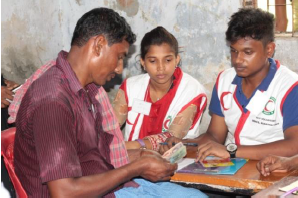
Figure 1: Cash distribution in the district of Bogra in Bangladesh during an FbF campaign in anticipation of a flood event. Photo: Red Cross Red Crescent Climate Centre
The Cash Community membership pack is now available outlining different ways to get involved in supporting members of the International Red Cross and Red Crescent Movement to deliver humanitarian cash assistance. By joining this community you can contribute to all aspects of cash programming, such as preparedness, emergency response or long-term recovery and development. All staff, volunteers, leaders, members, and partners of the Movement interested in humanitarian cash assistance can participate in this wide range of activities and knowledge exchanges around cash and its use as a programming tool. Sharing experiences, technical advice or simply participating in online discussions and policy debates are also ways to be an active member of this cash community, which enriches both personnel of the Movement and global networks around cash.
To find out how to get involved, download the Cash Community membership pack.
More information about the approach of the International Red Cross and Red Crescent Movement in the field of humanitarian cash assistance are available under “Our Approach”.
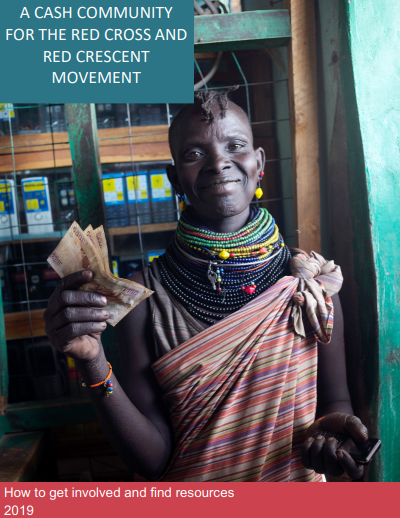
By David Peppiatt, Director of Humanitarian Cash Assistance, British Red Cross
Much has been said about cash aid (I use this as a far from perfect shorthand for delivering cash and voucher assistance). Is it really a game changer for the humanitarian system or just hype? Will humanitarian aid in 2030 be marked by a shift away from delivery of relief in-kind to digital transfers of money? Will financial service providers become some of our main operational partners in the future? Whatever the answers to these questions, it is clear cash, particularly in the form of digital payments, will be a far more integral part of the aid system than was the case when we embarked on our last strategy in 2010. Cash, it seems, will be the new normal.
Let’s start by acknowledging some of the transformative benefits of cash. In the right context, evidence from cash programmes has shown this can be a more efficient and more direct model of aid delivery with less overheads and, therefore, helping ever-tightening aid budgets to go further. Experience of recipients highlight how cash enables choice, dignity and ultimately a more empowering form of aid than a food parcel or relief handout. It can help catalyse the recovery of livelihoods and, in most contexts, it is better for local markets than trucking in aid from outside. Donors are convinced; it is no longer a question of “why cash?” as aid agencies are now asked, “if not cash, why not?” The focus, therefore, is less on the “why” but rather on the “how” cash aid in the future can be delivered most effectively. […]
As we reflect on the potential role of cash as an enabler in our new strategy, here are a few key opportunities and risks to consider:
– Cash and the digital revolution […]
– The potential for new partnerships […]
– Linking humanitarian cash transfers to social protection and development […]
– Globalisation and localisation of cash transfers […]
– Dignity for people in crisis […]
- Read the full article and other thought pieces on the Strategy 2030 platform for change
A collaboration between IFRC and emerge85, University of Michigan, and 510.global
Across the world, an increasing number of governments are embracing digital and biometric technology to transform how services are distributed and needs are assessed. Governments require the basic ability to track citizens, residents, and visitors, and digital identification systems have transformed how modern borders function. In emerging markets, the adoption rate has been particularly rapid. In India, a massive digital and biometric identification program called Aadhar is streamlining how services are disseminated, taxes collected, and votes cast in the world’s largest democracy. The promise of these digital systems is a combination of increased efficiency and reduced corruption through tighter control of resources.
The promises of digital and biometric identification systems also provide
-
To read the full article click here
Author
Rick Twelves – emerge85 (Twitter: @e85lab)
Researchers
Edward Happ – University of Michigan (Twitter: @ehapp)
Amy Newman – University of Michigan
(LinkedIn: https://www.linkedin.com/in/amy-newman-05108b4/)
Lars Stevens – 510 Global Netherlands Red Cross
(Email: lstevens@rodekruis.nl)
Contributors
Nadine Haddad – IFRC MENA
Amanda Robinson – Australian Red Cross
(Email: amrobinson@redcross.org.au)
Challenge: Lack of official identity
Due to lack of recognized proof of identity, roughly 1.5 billion individuals face challenges in accessing or enjoying basic rights and services. Imagine not being able to vote, proof employment or financial track records, setting up a bank account, registering a business, land ownership, receiving social protection payments, school enrolment, and even not receiving humanitarian assistance. A recognized ID is the gateway to dignity and equal participation in society.
We want to give control and ownership of personal data back to individuals, and out of multiple NGO systems, and at the same time increase collaboration between NGOs and their beneficiaries, with user consent as a key. Vulnerable populations and their contexts also introduce unique use cases and scenarios for technology, and we want to tackle the problem of Identities in a humanitarian context.
Help us find the solution
We would like to invite private companies, social enterprises, and other institutions to engage in a dialogue process and discuss the problems related to identities we see in the humanitarian space, and to understand concrete ways on how they could be solved using available technologies and know-how.
The project is managed by HIP – Humanitarian Innovation Platform – a collaborative platform that incubates humanitarian innovation. HIP was founded by Norwegian Red Cross, Save The Children, Norwegian Refugee Council & Norwegian Church Aid.
More info: Read the Executive Summary
Join us: Attend one of the Info Session by filling out the form for statement of interests
- Monday Feb 18., 16:00-18:00 CET (online)
- Thursday Feb 28., 09:00-11:00 CET (online)
- Monday March 11., 09:00-11:00 CET (online)
- Monday March 18, Onsite meetup only, New York (Afternoon EST, tbc)
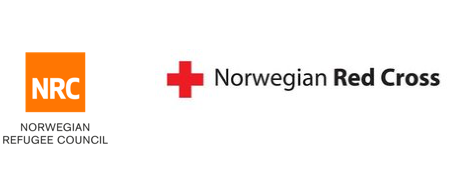
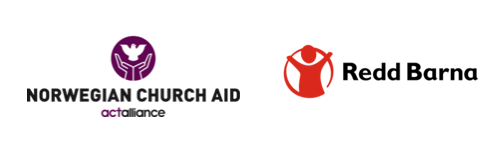

A webinar took place on 4 December 2018 to help users of the Cash Hub platform navigate through cash resources, tools and training opportunities, and to offer practical guidance on the use of the cash forum and helpdesk for the International Red Cross and Red Crescent Movement .
The recording of the webinar is now available, click here to watch it and learn more about the Cash Hub as well as using its platform and the collaborative workspace that hosts the cash community of the Movement.
The Cash Hub platform has been launched as a global resource for the International Red Cross and Red Crescent Movement, to increase its capacity to deliver cash-based assistance across a wide range of operations. It supports a cash community, open to cash practitioners as well all staff and volunteers in the Movement with an interest in cash.
Below you can find the list of speakers that participated in the webinar:
- Introduction by Margarita Griffith (IFRC) and David Peppiatt (BRC, Director of Humanitarian Cash Assistance Programme)
- Cash Hub structure and resources, Stefania Imperia (BRC, Cash Hub Knowledge Manager)
- Training and Development section, Jenny Harper (BRC, Cash and Markets Learning and Development Manager)
- Forum and Helpdesk, Peter Mujtaba (BRC, Cash Technology Analyst)
- Q&A, contribution from Emma Delo (BRC, Technical Team Manager)
A recent ICRC report, ‘Cash Transfer Programming in Armed Conflict: The ICRC’s Experience‘, suggests that although cash is often best in conflict, it is not always the most appropriate solution. It also argues that delivery of cash assistance is a ‘tool of humanitarian action’, rather than a success in itself. Read the full article on the ICRC website.
After the earthquake, the generosity of the UK public toward the people of Nepal was inspiring.
Donations to the Disasters Emergency Committee’s (DEC) earthquake appeal reached £87 million. The DEC then shared the funds among organisations working in the country, including the British Red Cross.
This plus the equally generous donations to the Red Cross’ own appeal supported us to give over 8,000 people cash grants of around £140. Families used the money to buy seeds, tools and other things they needed to start farming again. Read the full blog on the British Red Cross website and discover more about the impact of cash grants on the livelihoods of people affected by the earthquake in Nepal.
Giving cash can, paradoxically, do good while saving charities money.
Link to the article: https://www.thirdsector.co.uk/kirsty-marrins-digital-revolutionising-humanitarian-aid/digital/article/1494082
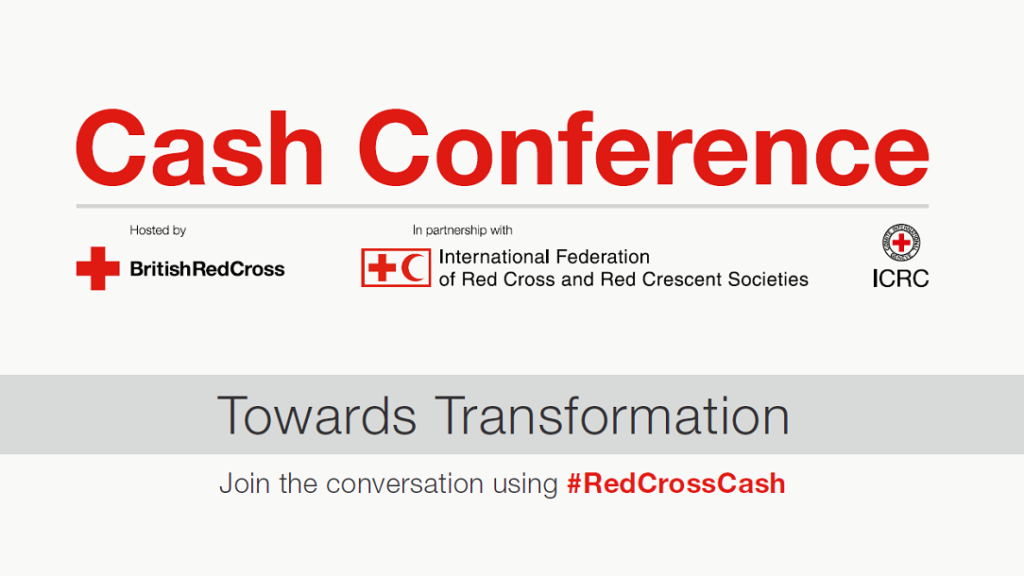
On 13th September 2018, the British Red Cross convened a Cash Conference on behalf of the International Red Cross and Red Crescent Movement, guided by the theme ‘Towards Transformation’.
This report summarises the key themes that emerged on the day, with a view to further the global debate on the scale-up of humanitarian cash transfers:
Download the executive summary here.
Download the full report here.
Video recordings of the different panels are available on YouTube:
Watch the opening remarks.
Watch the keynote speakers.
Watch the session on localising the cash agenda.
Watch the session on connecting humanitarian cash and social protection.
Watch the session on innovation in cash transfer programming.
Watch the session on cash in conflict.
Watch the closing remarks.
To gain a practical overview of how the International Red Cross and Red Crescent Movement uses cash in emergencies watch this video with examples from Kenya (Isiolo) and British Virgin Islands.
